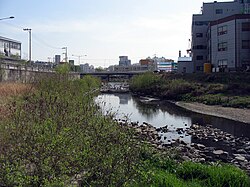Uiwang
|
Uiwang 의왕시 |
||
|---|---|---|
| Municipal City | ||
| Korean transcription(s) | ||
| • Hangul | ||
| • Hanja | ||
| • Revised Romanization | Uiwang-si | |
| • McCune-Reischauer | Ŭiwang-si | |
 |
||
|
||
 Location in South Korea |
||
| Country |
|
|
| Region | Sudogwon | |
| Administrative divisions | 6 dong | |
| Area | ||
| • Total | 53.46 km2 (20.64 sq mi) | |
| Population (Dec. 2014) | ||
| • Total | 158,482 | |
| • Density | 2,964.5/km2 (7,678/sq mi) | |
| • Dialect | Seoul | |
Uiwang (Korean pronunciation: [ɰi.waŋ]) is a city in Gyeonggi Province, South Korea. It is one of many satellite cities that ring Seoul, making up the Seoul National Capital Area. Its largest immediate urban neighbor is Anyang (South Korea). The low peaks of the Gwangju Mountains shape the local landscape.
Rail transportation is important in Uiwang, which is home to the Korean Railroad Museum and Korea National Railroad College. Seoul Subway Line 1 passes through the city, as does the Gyeongbu Line. In addition, a terminal of Hanjin container shipping is located here.
Uiwang lies just south of Seoul. It is bounded to the east by Baegunsan (백운산), Barasan (바라산), the lower slopes of Cheonggyesan (청계산), and Maebongsan (매봉산); to the south by the city of Suwon, to the west by Ansan, Gunpo, and Anyang; and to the north by Gwacheon.
There are two noteworthy reservoirs in the city: Baegun Lake (백운호수) at the foot of Baegunsan, and Wangsong Lake (왕송호수), by the border with Suwon. Baegun Lake has a number of foreign restaurants, while Wangsong Lake, accessible from Uiwang Station, has a recreational draisine, the Korean Railroad Museum, and Uiwang's Nature Education Park. The source of the Anyangcheon - a tributary of the Han River - is in Uiwang, as is the source of the Haguicheon, itself a tributary of the Anyangcheon. Most of Uiwang is thus drained northwards. However, the Hwanggujicheon's sourc eis also n Uiwang, and this flows south, eventually emptying into the Yellow Sea at Asan Bay.
...
Wikipedia

